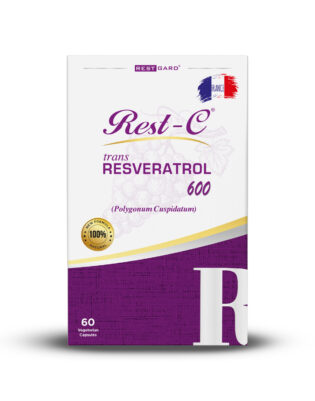What is Resveratrol?
Resveratrol is known for its many phytochemical studies. Experts have identified this unique antioxidant as a source of youth due to its effectiveness against various age-related diseases. In the late 1980s, while researchers were reading The French Paradox, they became interested in Resveratrol. The French diet is generally a fatty diet, but the French generally have a lower risk of heart disease. They soon discovered a red wine compound isolated from the grape skin. The next task was to find out how it works in the body. Research since its initial discovery has uncovered the many benefits of Resveratrol, including promoting heart health, supporting normal brain function and promoting healthy aging. This compound has powerful antioxidant properties that promote health at the cellular level. . In this article, we'll take a look at 10 facts about Resveratrol, including what it is, where to find it, and whether you should get it in your diet regularly.

Resveratrol is a phenolic compound called stilbene; plants produce them in response to injury, infection, fungal attack, or ultraviolet radiation. Compounds that protect plants can also protect you. Resveratrol's chemical formula is C14H12O3, molecular weight is 228.25 g/mol. Like Resveratrol, most stilbenes are phenol brightly colored, aromatic, and good for your health. Most stilbenes come from berries and grapes. It has benefits such as powerful antioxidants that fight “oxidative stress” that damages cells. Resveratrol, a stilbene compound, supports bone, cardiovascular and liver health. This unique nutrient also supports healthy aging, improves cognitive function and normalizes hormone production.
Resveratrol mainly exists in two forms: a trans and a cis form. These forms are isomers – compounds that have the same number and type of atoms but arranged in different structures. The cis and trans isomers, in particular, have atoms joined in the same order, but in a slightly different geometric configuration. This change polarizes the cis isomers – they carry an electrical charge – and the water-soluble and trans molecules are nonpolar and oil soluble. This gives them quite different properties, including bioavailability – basically, the degree and rate at which your body absorbs them after they pass through the digestive system, liver, and bloodstream. Below, we break down the differences and explain a third form.
Dihydro-Resveratrol
This form is found in wine, but it's also found in your intestines after using trans-resveratrol. Probiotic microbes in your digestive tract interact with trans-resveratrol and metabolize it to dihydro-resveratrol.
Cis-Resveratrol
A double bond isomer of trans-resveratrol, this molecule is polar and water-soluble in water, so it enters cells less easily and is less easily used by the body. Sometimes you'll find it in low-quality, less pure supplements as fillers.
Trans-Resveratrol
Because trans-resveratrol is fat-soluble, it binds to lipoproteins (fat-containing proteins) allowing it to easily cross cell membranes. However, the body metabolizes and eliminates it quickly, so its bioavailability is relatively low at around 25 percent – but higher than cis-resveratrol.
Resveratrol is found in many plant foods, especially fruit, and can be purchased as a dietary supplement. Because Resveratrol is abundant in grape skin, it is found in wine, especially red wine. Grape seeds or meat do not contain this compound. Grape seed extract is a powerful antioxidant.
Scientists have discovered Resveratrol in other brightly colored fruits, such as:
• Grape
• Blueberries
• Cranberry
• Cocoa and dark chocolate
• Pistachios
• Itadori or Japanese knotweed tea
Some Asian countries drink Itadori tea, a traditional herbal supplement believed to prevent heart disease and stroke. . This source of Resveratrol can cause diarrhea or cramps. Only 25% of resveratrol is rapidly metabolized and obtained from food sources. Conscious natural Resveratrol intake while consuming these foods is 0.3-1.5 mg daily.
Numerous studies have shown that Resveratrol has no serious side effects and is generally safe to consume; it has shown to be "generally recognized as safe," (GRAS) according to the United States Food and Drug Administration. Some people experience a mild gastrointestinal effects such as vomiting, bloating, and diarrhea when too much is consumed.
Because Resveratrol has the potential to interact with certain medications, check with your healthcare provider before taking Resveratrol supplements. Do not take Resveratrol if you are pregnant or breastfeeding because the safety of Resveratrol in pregnant women has not been adequately established.
Many people are looking for antioxidant supplements that can help relieve irritation and prevent harmful organisms. Resveratrol delivers it all. Found in grapes, fruit, dark chocolate, and dietary supplements, Resveratrol has many health benefits. Trans-resveratrol is the most effective form as it easily crosses the blood-brain barrier and cell membranes.
Resveratrol supports vitality, extends lifespan, and helps maintain age and lifestyle health. This unique nutrient supports brain health, builds strength, prevents weight gain and helps balance hormones in both men and women. Not only that, but Resveratrol also has positive effects on heart health, protecting the liver, relieving joint pain and improving the appearance of the skin.
GlobalHealingCenter, 2019, 10 Resveratrol Benefits for Heart, Spirit and Fountain of Youth

